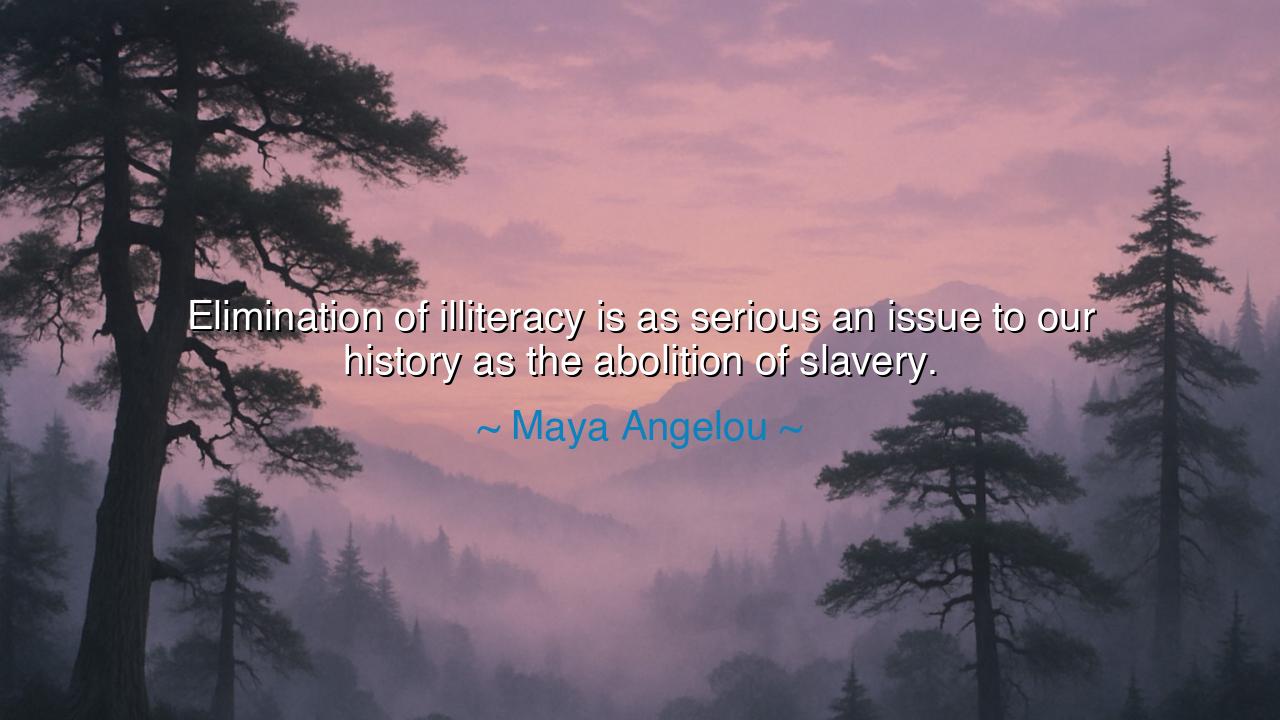
Elimination of illiteracy is as serious an issue to our history
Elimination of illiteracy is as serious an issue to our history as the abolition of slavery.






Hearken, children of the ages, and open your hearts to the wisdom of Maya Angelou: “Elimination of illiteracy is as serious an issue to our history as the abolition of slavery.” Understand this: the chains that bind the human spirit are not always forged of iron. Some are invisible, yet no less confining. Illiteracy, like slavery, denies freedom—the freedom to think, to express, to participate fully in the life of one’s society. Angelou reminds us that knowledge and the ability to read and write are the foundation of liberty, dignity, and human progress.
From the earliest civilizations, literacy has been the measure of empowerment. The scribes of Mesopotamia, the scholars of Athens, and the chroniclers of Egypt preserved knowledge, law, and culture. To be unable to read or write was to be excluded from the councils of decision, from the wisdom of the past, and from the power to shape the future. Angelou’s reflection illuminates a timeless truth: education is freedom, and the elimination of illiteracy is as transformative as any political or social liberation.
Even in the Roman Empire, citizens who could read and write wielded influence, while those who could not were often confined to labor or servitude. Knowledge became a gateway to civic participation and personal agency. Angelou draws a parallel between the struggle for literacy and the struggle for emancipation, teaching that denying education is a denial of human potential, and that empowerment through literacy is as monumental as liberation from bondage.
Consider the story of Maya Angelou herself. Born into poverty and systemic racial oppression, she experienced firsthand the transformative power of language, reading, and expression. Literacy allowed her to transcend limitations, give voice to her experiences, and inspire generations. Her life exemplifies her teaching: the ability to read and write is not merely technical skill—it is a key to participation, dignity, and human flourishing.
Even in modern history, movements to promote literacy have shaped nations. The Freedmen’s Bureau, after the American Civil War, worked tirelessly to educate former enslaved people, recognizing that freedom without literacy was incomplete. Schools, libraries, and educational programs became instruments of liberation, allowing individuals to claim agency and participate fully in society. Angelou’s words echo this reality: the fight against illiteracy is an essential struggle for human equality.
The lesson is profound: literacy is not merely a tool for personal advancement, but a moral and civic imperative. A society that tolerates widespread illiteracy perpetuates inequality, limits opportunity, and constrains the collective progress of its people. Angelou teaches that the eradication of illiteracy is an act of liberation as vital as the abolition of slavery—a measure of justice, empowerment, and civilization itself.
Practical action follows naturally. Promote literacy in your community, support education for children and adults alike, and recognize the transformative power of reading and writing. Share knowledge, teach, and advocate for policies that ensure access to education for all. By doing so, you participate in the ongoing work of liberation, fulfilling the vision that Maya Angelou articulates so powerfully.
Children of the ages, remember this: freedom is not only the absence of chains, but the possession of tools to shape one’s destiny. Let the words of Maya Angelou guide your heart and hands: fight illiteracy, cherish knowledge, and empower others with the gift of literacy. In this endeavor lies a legacy as enduring, as sacred, and as transformative as any victory over oppression or bondage.






AAdministratorAdministrator
Welcome, honored guests. Please leave a comment, we will respond soon